The initial announcement has now gone out to SirsiDynix customers — the all singing, all dancing Horizon 8.0 will not receive a general release.
Instead SirsiDynix will concentrate their efforts on developing another new system (codenamed “Rome”) which will be built on the Unicorn architecture.
Rumo(u)rs
Oh boy…
Don’t you just hate it when someone tells you that something major is about to happen, but you really don’t want to repeat it because it might not be true and you’d just be spreading unfounded gossip. But, then again, it’s so absolutely huuuuuuge that you can’t find a hat big enough to keep it under? Anyway, something may (or may not) be about to happen that could rock your world.
Let’s sit back, fasten our seatbelts, and see what happens in the next 48 hours in LibraryLand…
If you build it, will they come? (part 2)
I hate being reminded of how quickly time flies!
Nearly a year ago, I added a post about how five of our OPAC tweaks were being used:
1) “did you mean?” spell checker suggestions for failed searches (more info)
2) serendipity keyword suggestions for failed searches (more info)
3) “people who borrowed this also borrowed…” suggestions (more info)
4) books with similar subject headings (more info)
5) other editions of books (more info)
I left the logging running, so we now have 11 months worth of data to show usage — by “usage” I mean when a user actually clicked on one of the links displayed by the tweak.
Click any of the graphs to view the full sized version.
Usage by month
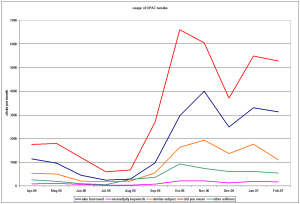
Being an academic site, usage of all library services varies by month — usage drops heavily during summer, and dips during Christmas and Easter.
You can easily see that “did you mean” and “people who borrowed this” are the most heavily used.
The “people who borrowed this” and the “similar subjects” tweaks are both ones that promote serendipity when browsing items — you’re viewing one book but are being given links to other relevant items.
Although the “serendipity keyword suggestions” is the least used feature (partly because it only appears under certain circumstances), it’s getting enough usage to justify the couple of hours coding it took.
Here’s a breakdown of the average number of daily clicks, along with the peak number of clicks each tweak has received in a single day…
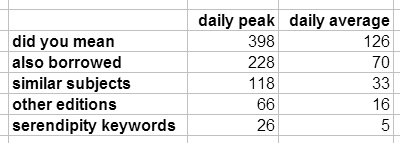
Usage by day
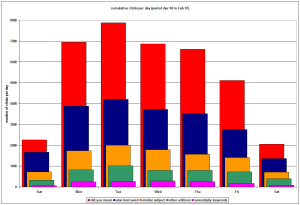
It’ll be interesting to see if Tuesday is also the busiest day for other library services.
Usage by tweak
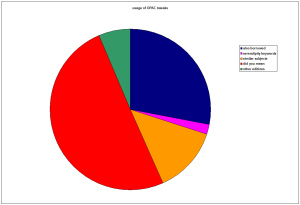
There’s almost a doubling in usage going on here from the “serendipity keywords” to the “did you mean”. I said it last time and I’ll say it again now — if you don’t have a spell checker on your OPAC, then you need to hire a web developer and add one a.s.a.p.!
Usage per hour
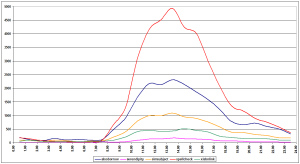
That odd little bump in usage around 5pm has smoothed out now.
Conclusion
Even with the least used tweaks, there’s more than enough usage to justify the development time, so I’m extremely happy with the graphs.
Assuming I don’t get run over by a bus, call back next year to find out if the usage has increased!
wine + coding + book covers = something
I’ve made something, but I’m not too sure what it really is or if it’s of any use what-so-ever!
I started playing around with the “relationships” code (briefly mentioned here) to see what would happen if you selected multiple books and ranked the aggregated suggestions by frequency of appearance.
For example, here are 4 O’Reilly books that I’ve selected. The code pulls in the list of suggestions for each book, then (underneath the line) displays the books that appear in all 4 lists, followed by the ones that are only common to 3 lists, then 2, then those that only appear in one of the lists (with up to 100 being displayed in total).
So, in theory, if I’d picked up those 4 books and was looking for a couple more to borrow, then “PHP & MySQL Web Development” and “HTML & XHTML” should be safe bets.
You can click on any of the books above the line to remove it from the selection. If you click on “HTML” and “Web Based Applications” books to remove them, then you should be left with the “PHP” and “MySQL” books — in that case, a book on e-commerce becomes the first suggestion.
To start with a random book, use the following link and reload the page until you find one that interests you and that has several suggestions…
https://library.hud.ac.uk/perl/relationships2.pl
…then try adding one of the suggested books to the selection (by clicking on it) to see what the revised suggestions are.
CILIP: “Re-imagining the Library” Executive Briefing
I’ve got the great honour of speaking at the CILIP “Re-imagining the Library” Executive Briefing next week, although I’ll admit that I’m not looking forward to the journey down to London — getting up at 5am always disagrees with me, plus my body will think it’s lunch time at 9am!
I remember reading a librarian’s blog post where she said that short presentations are the hardest and I’ve got just 15 minutes …that’s only 900 seconds! Plus I’m the last on before lunch, and I know how fidgety I get at conferences if the speaker looks like he might start eating into the precious lunch break 😀
Looking at the final version of the presentation, I can’t help feeling I’m trying to cram too much in… but there’s so much I want to talk about! Rest assured, I won’t be stood there talking in a slow boring monotone — I’ll be gabbling 10 to the dozen like a demented chipmunk on helium.[1]
After timing myself this morning, there should be exactly 9 seconds spare for quick questions at the end. I did consider adding subliminal images of sandwiches and cakes to the “any questions?” page to try and ensure that no-one asks me anything that I can’t answer in 3 words or less (preferably “Q: Is it time for lunch now?”, “A: Yes!”).
[1] I did originally type “chipmonk”, which presumably would be a deep fat friar?[2] Also, if you do a Google search for “ten to the dozen“, it proudly tells you that…
ten to the dozen = one trillion
…yet it does understand what a bakers dozen is 😀
[2] this is why I never tell jokes during presentations
“I’m in the mood for watching a film about…”
Via this post on Lorcan Dempsey’s blog, I noticed that the Internet Movie Database now has genre keywords and tag clouds.
For example, library brings up a cloud where murder appears to be the largest tag. The list of films matching the chosen facet(s) is ordered by rating, so you get instant recommendations for whatever mood you’re in.
It’s also fun trying to guess which films might match multiple facets — 10 points if you can name a film that matches both “library” and “flame thrower” without looking!
“Welcome to LibraryQuest…”
I had a really good meeting with Iman and Andrew Wilson (from Huddersfield based Blink) on Friday morning to see if we can set up a new project that combines the library with all (or some) of the following: gaming, RFID, serendipity, attracting non-users, improving book findability, and generally having fun.
Blink have done some really funky stuff with RFID at MAGNA near Rotherham and at the local Media Centre, and Iman did a cool project that combined the OPAC with social networking.
One of the ideas which was briefly kicked around the table has really grown on me over the weekend –turning use of the library and the library services into a game. In a similar way to many MMORPGs, you would earn (or even lose) points as you interacted with the library.
For example, any of the following might gain you points…
1] bringing a book back on time
2] bonus points for returning a book that fulfils a hold request
3] borrowing a book
4] bonus points for borrowing a book that’s previously had low circulation or not been borrowed recently
5] bonus points for borrowing a book that’s outside of your normal borrowing subject areas
6] using the automated systems for renewing books (e.g. OPAC or telephone renewal system)
7] using the other services provided by the library (e.g. electronic resources)
8] visiting the library
…and the following might lose you points…
1] bringing a book back late
2] not paying fines promptly
3] breaching the library policy on acceptable behaviour
The more I thought about it, the more it started to dove-tail with store loyalty/reward cards — we often penalise “bad” library behaviour (e.g. through fines) but rarely reward “good” behaviour. I always feel sorry for students who have never been fined before and then genuinely forget to bring some books back — maybe they could “cash in” some of their well earned points to offset a fine?
Perhaps points could also be converted into printing credits, or exchanged for low cost materials (e.g. ring binders, USB memory sticks, binding materials)?
Hmmm… I wonder how students would react to seeing something like this in their account page in the OPAC?
“You currently have a library score of 5,182 points and are ranked #176 out of all Applied Sciences students. You have gained 287 points in the last 7 days.”
Creatures of the night
Those who know us well will know that we get a lot of wildlife around (and sometimes inside) our house, some of which appears in this Flickr set.
In recent months, a pair of tawny owls (Wikipedia/RSPB) have taken to hunting in a patch of woodland opposite our house. In fact, one of their favourite perches is to sit on top of the telegraph pole opposite our bedroom window. Occasionally they’ll start calling out to one another (RSPB audio) — they’re so close that you can hear them in every room of the house and it’s slightly eerie when you’re trying to fall asleep.
My attempts to grab some photographs of the owls this evening wasn’t a great success — the autofocus on my digital camera steadfastly refused to lock onto the owl in the low level lighting conditions, although (frustratingly) it would slip in and out of sharp focus as it tried.
So, here are possibly the worst photographs ever taken of an owl!!! 😀




Tilt-Shifting
Whilst browsing through images tagged with “hitchcock” on Flickr, I came across this image by Paul Szynol:

My initial reaction was “that’s a cool scale model” and then I started reading the comments… my mind boggled when I realised it wasn’t a model, but a real photograph that’s undergone a process called “tilt-shift” (which is something I’d never heard of before).
According to Wikipedia:
Tilt-Shift Miniature Faking is a process in which a photograph of a real location or object is manipulated so that it looks like a photograph of a scale-model miniature. By distorting the focus of the photo, the artist fools the eye into believing that the distances in the photograph are much smaller than they really are.
A search on Flickr brings up hundreds of other tilt-shifted images, and I couldn’t resist having a go myself (a quick Google search show you how):

(the original image is here)


Librarians as books – part 3
I’ve tweaked the code to try and improve the final image (more info below), and here’s the latest batch…
Peter

(largest version)
Ruth Kneale (Random Musings from the Desert)

(largest version)

(largest version)
Helene Blowers (LibraryBytes)

(largest version)

(largest version)
Continue reading “Librarians as books – part 3”